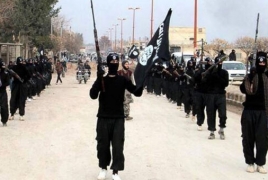U.S. says IS chemical weapons expert captured, questioned March 10, 2016 - 11:06 AMT PanARMENIAN.Net - A chemical weapons expert from the Islamic State (IS) group in Iraq has been captured by U.S. special forces and is being questioned, BBC News reports. The man was once a specialist in chemical and biological weapons for Saddam Hussein, the Iraqi leader overthrown by the U.S. invasion in 2003, Iraqi and U.S. sources told U.S. media. Named as Sleiman Daoud al-Afari, he was reportedly seized last month. In a statement to the BBC, the Pentagon would not confirm his capture. However, its spokesman confirmed U.S. special forces had begun operations in Iraq - part of a more aggressive strategy against IS. The man has already told interrogators how IS loaded mustard gas into shells, U.S. sources told the New York Times. Last month, sources at the global chemical watchdog, the Organization for the Prohibition of Chemical Weapons (OPCW), announced that sulphur mustard had been used last year in an attack on Kurdish forces in Iraq blamed on IS. If confirmed, it would be the first known use of chemical weapons in Iraq since the fall of Saddam, the BBC says. Afari was identified as a former employee of the Military Industrialization Authority, which functioned under Saddam, who used poison gas against Iraq's Kurdish community in the 1980s. Unnamed U.S. defense sources told the New York Times Afari was being held in Irbil, a Kurdish stronghold in northern Iraq. He is being questioned about IS plans to use mustard gas, which is banned under international law, in Iraq and Syria, the paper says. The alleged IS weapons expert reportedly gave his captors details of how the group had weaponized mustard gas into powdered form and loaded it into artillery shells. One defense official quoted by the paper said the gas was not concentrated enough to kill anyone but that it could maim people. Mustard gas, which is liquid at ambient temperature, is a powerful irritant and blistering agent which causes severe damage to the skin, eyes and respiratory system and internal organs. The International Committee of the Red Cross (ICRC) visited the prisoner after it was notified of his capture by U.S. officials, the paper adds. No details were given. Two unnamed Iraqi intelligence sources quoted by the Associated Press described Afari as the head of the IS unit trying to develop chemical weapons. A Pentagon spokesman told the BBC that he cannot confirm these reports. "What I can tell you is, and as the [Defense] Secretary [Ashton Carter] said recently, the Expeditionary Targeting Force [ETF] has begun operations in Iraq, but we will not discuss the details of those missions when it risks compromising operational security. "One of the goals of the ETF is to capture ISIL [IS] leaders. Any detention would be short-term and coordinated with Iraqi authorities." U.S. officials announced last week that a U.S. commando force had captured an IS leader in Iraq without giving his name. IS, a fundamentalist Sunni Muslim group also known as Daesh, is notorious for its brutal methods in gaining territory in Iraq and Syria. It claimed a number of devastating gun and bomb attacks outside the region in 2015, notably the attacks on Paris and downing of a Russian airliner over Egypt. Photo: ABC News Azerbaijani authorities report that they have already resettled 3,000 people in the Nagorno-Karabakh town of Stepanakert. On June 10, Azerbaijani President of Azerbaijan Ilham Aliyev will leave for Turkey on a working visit. Azerbaijani President Ilham Aliyev arrived in Moscow on April 22 to hold talks with Russian counterpart Vladimir Putin. Authorities said a total of 192 Azerbaijani troops were killed and 511 were wounded during Azerbaijan’s offensive. Partner news |